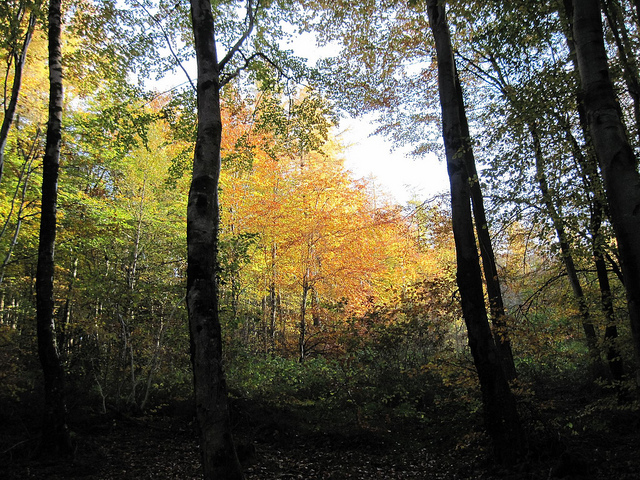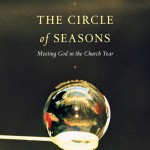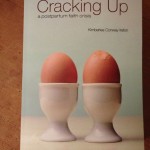
6
This place not Eden is but Promise Land—
Fertile fields, livestock, work, sweat on the brow
Of mother, father, son, whose open hands
Warm welcome did extend when ‘neath the bough
Of apple-blossomed Jabbok I first passed
To stand upon their stoop and knock and wait
Atremble and alone. As Esau cast
Past wrongs to wind and welcomed his womb-mate—
The prodigal returned—with tears, embrace
And joy that bowed his brother to his knee
In awe at Esau’s unexpected grace—
So these kind unknown kin did welcome me
To share their bread, to stand upon their sod,
Receive their care—their face the face of God.
—E.B., 1818
The weeks passed. Autumn’s days of weak sunshine alternated with low mists and fine rain and finally gave way to the almost unremitting grey skies of winter. Maggie’s belly thickened so that she could no longer button her jeans and had to use a rubber band to hold them up. Still she and Gram sorted through Helen’s things each morning, and each afternoon Maggie tromped outdoors. She almost always managed to run into James, though sometimes she had to walk nearly to Stonewold to do so. They talked now not just of sheep and farming but of poets and poetry.
One dull November day as they crossed the field that Bill had rented from Helen and now rented from Gram, James said, “I miss Milton. Until I wrote my thesis on Samson Agonistes, he was my favorite.”
“When I consider how my light is spent,” Maggie quoted, flinging her arms wide to embrace the grey day.
“Ere half my days in this dark world and wide,” James quoted back at her, grinning.
“James!” she exclaimed. “Why don’t we read Paradise Lost? I’ve never read it, and I’ve always wanted to. We could read it together!”
And they did.
In mid-December they finished Paradise Lost and launched into Paradise Regained. Maggie and Gram finished clearing out the attic and moved on to the upstairs bedrooms that were almost as full of stuff as the attic had been. Maggie’s belly swelled so that she could no longer even use a rubber band to hold up her jeans. She and Gram had to go buy real maternity clothes. The day she felt the baby’s first kick, a thrill shot from her belly straight through her heart to her head.
It pricked her conscience every now and again that she had not yet told James. She knew she should, but she didn’t know how. “Oh, by the way, sorry I didn’t mention it sooner, but I’m pregnant.” It was too awkward, and the longer she waited the more awkward it became, especially since she suspected that her feelings for him were not strictly friendly, a suspicion she had no intention of exploring and did her best to ignore altogether. She shrugged her feelings, and her guilt, away. At some point, he would know. Some days she thought he must already know—baggy shirts and bulky sweaters could only hide a bulging belly for so long—but he never by word or look intimated that he knew.
January brought more gray weather, more rain, more Milton, and more and harder kicks from the baby. One rainy afternoon, late in the month, she accompanied James back to the Jordans’ barn, where he began to fill the feed boxes while she fondled the small ears and stroked the soft head of her favorite sheep, a Ryeland named Brown Betty.
She’d had another difficult conversation with Gram over lunch. “You need to decide what you’re going to do, Maggie,” Gram had said gently but firmly. “You only have three more months to find adoptive parents, if that’s the path you’re going to take.” It was the path Gram wanted her to take, Maggie knew, and the path her parents wanted her to take as well. Then she could go back to school and finish her degree, go back to her old life as if she really were just larking in England this year.
James’s voice broke the silence. “My parents weren’t the only ones killed in that motor-car smash,” he said.
Maggie jerked her head up to look at him. It took her a moment to register what he’d said. Then a knot of foreboding formed in her chest.
“My wife was in the car, too. We had just found out she was expecting. We were going to announce it at my graduation party.”
Maggie’s eyes filled with tears, and the knot in her chest turned into a stone that weighed on her heart. “Oh, James.” She crossed the stall and took his hands in hers. “Oh, James,” she said again, her voice a broken whisper. “I’m so, so sorry.”
His eyes were misty as he said, “It was five years ago, Maggie. Time—” his voice cracked.
She nodded. “I know. The great healer.” Brown Betty butted her head against Maggie’s backside. She smiled through her tears. “And sheep help, too.”
James smiled back, a little sadly. “Are they helping you?”
Maggie’s smile faded. She released his hands and patted Brown Betty’s head. “What do you mean?” she said, even though she was pretty sure she knew exactly what he meant.
“You’re pregnant,” he said, matter-of-factly.
Maggie couldn’t speak. She could only stand there awkward and ashamed, feeling her face drain of color.
“When were you planning to tell me?”
Maggie kept her eyes on Brown Betty. “I wasn’t,” she finally said, softly. “I figured you’d figure it out eventually.” She shrugged. “And you did.”
A long silence followed, the only sounds the rustle of the sheep as they rummaged in the feed boxes. Maggie finally hazarded a look at James. He was studying her, his face inscrutable, and she looked quickly back down at Brown Betty. Was he angry? Hurt? She hadn’t meant to hurt him.
No, she realized, he was not angry. He had just told her about his wife. She understood why he had not told her sooner. It was the same reason she had never mentioned the baby or Brian. And she understood why he chose to tell her now. It felt like an apology, and forgiveness, and an invitation.
“We met my freshman year in college.” She sat down on a nearby hay bale, and James sat down beside her. Keeping her eyes on Brown Betty, she briefly told him the whole story. “So Brian went off to Yale, and I came here,” she concluded.
James did not say that Brian was a jerk or that she was better off without him, for which Maggie was thankful. He only placed a gentle hand on her arm and said, “I’m sorry, Maggie. You deserved better.”
They sat for a long moment, his hand on her arm offering her silent assurance of his presence and care. His fingers, she noticed, were long and lean, like his face, his whole frame, long and lean and strong. He gave her arm a gentle squeeze before he stood and returned to feeding the sheep. “Has it been long enough?”
“Long enough?”
“For time—you know.” He gestured to Brown Betty. “And sheep.”
Maggie scratched the top of Brown Betty’s head. “I think so. A little. I’m not so angry as I was. Some days—some days I’m even happy, when I don’t think about the future. Gram says I need to think about the future, that I need to decide what I’m going to do.” She rested a hand on her belly. “But whenever I think about it, I feel afraid, because I don’t know what to do.”
James was silent for a moment. “I don’t know about that, Maggie. I think you do know what to do—or at least what you want to do. You’re only afraid to do it.”
Maggie started to protest, but her words died on her lips. Did she know what she wanted? Gram and her parents wanted her to give this baby up for adoption, just as Brian had wanted her to “take care of it.” What did she want? She wanted to stop loving people to the point of annihilating herself. She wanted to stop giving them what they wanted at her own expense. Love, she had always known, was costly. But she realized now that it was a costliness that filled you, as this baby was filling her, not a costliness that left you bereft of yourself. She looked at James, filling the feed bins with hay. He had loved much—and lost much. Love had cost him—deeply—but he still had himself—his strength of character, his kindness, his sense of humor, his gentleness. He could have chosen bitterness—his parents, wife, and unborn child—all killed! But he honored his love for them by remaining himself, by continuing to live, by learning to laugh again, to love again—the Jordans, Helen, Floss, his sheep, even, Maggie thought, herself, a little, as a friend, and maybe—but she slammed the door on that thought.
James was right. She knew what she wanted to do. She only lacked courage to do it.
“James?” she said, standing and brushing hay off her jeans. “I’m going to go. There’s a difficult conversation I need to have, and I want to get it over with before I lose my nerve.”
James smiled as if to say good for you. “I’m almost done. I’ll walk you home. It’s nearly dark out.”
Maggie knew better than to protest. James MacKinnon would never let a pregnant woman walk home across wet fields in the dark, especially if she was headed there to face her future. She did not want to protest. She welcomed his company.
Photo by Joysaphine, Creative Commons via Flickr.

